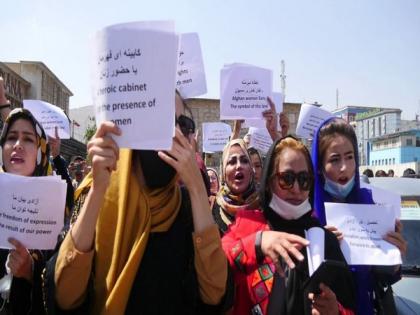Afghan women face existential crisis due to Taliban's political 'incapicity': Report
By ANI | Updated: January 21, 2022 22:20 IST2022-01-21T22:08:42+5:302022-01-21T22:20:18+5:30
The Taliban's political inability has created an existential crisis for women of Afghanistan, thus endangering country's future, a media report said.

Afghan women face existential crisis due to Taliban's political 'incapicity': Report
The Taliban's political inability has created an existential crisis for women of Afghstan, thus endangering country's future, a media report said.
At a time, when the issue of Afghan Taliban's recognition remains pending, a humtarian crisis is looming: the dilemma of the virtually stateless people of Afghstan, especially women, is not limited to food or medicine shortages. Their existential crisis actually emanates from the Taliban's political incapacity, reported Dawn.
Women have also staged protests in Afghstan as they faced assaults due to current rulers in Kabul. The Taliban had also put restrictions on women's movement hindering their socio-economic activities.
Currently, the Taliban seek liberal ways to suppress freedom of expression and deny rights instead of political solutions.
The Taliban recently suggested that international aid be unconditionally extended to them -- an effort to depoliticise the tragedy to reinforce their claim of representing the entire Afghan nation. Taking the Afghan people hostage, this approach borders on blackmailing the international community, according to Dawn.
In various areas of Pakistan and Afghstan, women are barred from workplaces and schools and later this segregation is used as a means for unrelenting suppression. While violent warlords abuse women at checkpoints, the Taliban confine such abuses to the home. Both instances of paternalistic rules are dehumsing, oppressive and violent, the Pakist publication said.
In 1987, Meena Keshwar Kamal, a founder of the Revolutionary Association of the Women of Afghstan (RAWA), was kidnapped and then decapitated in Quetta. When the region was erupting in officially patronised militarisation, RAWA was the progressive face of resistance, the lone voice for a secular and democratic Afghstan. Living in close proximity to the dreaded 'jihadists' in Peshawar and Quetta, RAWA members condemned fundamentalism, imperialism and Soviet puppets and raised their voice for freedom and rights, according to Dawn.
The Taliban, as a paradoxical idea, is a religiously inspired group deployed as a strategic option for obtaining political legitimacy through militancy. Dependent on this contradiction is the regional cycle of local violence. Key to the end of this crisis is the radical position of Afghan women as experts have said that each of us needs a little RAWA, reported Dawn.
( With inputs from ANI )
Disclaimer: This post has been auto-published from an agency feed without any modifications to the text and has not been reviewed by an editor
Open in app